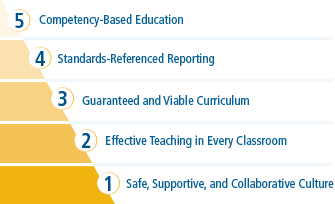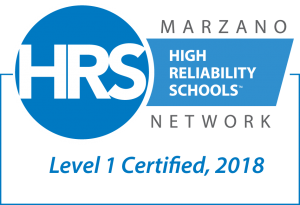High Reliability Standards
In Norwalk Community Schools, The Marzano High Reliability Schools™ framework is utilized to guide our school improvement efforts. All professional learning is a response to the data collected to identify areas of focus to improve student learning aligned to this school improvement framework. Norwalk Schools have been implementing a wide range of effective initiatives, and many educators are already practicing research-based strategies. The HRS framework does not replace professional learning communities, the Art and Science of Teaching framework, teacher evaluation and development, sound curriculum (including those aligned with the Common Core State Standards), vocabulary instruction, instruction in critical thinking and reasoning skills, formative assessment, standards-based grading and reporting systems, or student mastery systems.
Instead, this framework shows how best practices work together and provides indicators to empower districts and schools to measure their progress on attaining five increasing levels of reliability:
- Competency-based education
- Standards-referenced reporting
- Guaranteed and viable curriculum
- Effective teaching in every classroom
- Safe, supportive and collaborative culture

Using the school improvement framework and indicators, districts and schools can drive permanent, positive, and significant impacts on student achievement by synthesizing multiple complex initiatives into one harmonious system.
High Reliability School Improvement Indicators
Level 1: Safe and Collaborative Culture
1.1: The faculty and staff perceive the school environment as safe and orderly.
1.2: Students, parents, and the community perceive the school environment as safe and orderly.
1.3: Teachers have formal roles in the decision-‐making process regarding school initiatives.
1.4: Teacher teams and collaborative groups regularly interact to address common issues regarding curriculum, assessment, instruction, and the achievement of all students.
1.5: Teachers and staff have formal ways to provide input regarding the optimal functioning of the school.
1.6: Students, parents, and the community have formal ways to provide input regarding the optimal functioning of the school.
1.7: The success of the whole school, as well as individuals within the school, is appropriately acknowledged.
1.8 – The fiscal, operational, and technological resources of the school are managed in a way that directly supports teachers.
Level 2: Effective Teaching in Every Classroom
2.1: The school leader communicates a clear vision as to how instruction should be addressed in the school.
2.2: Support is provided to teachers to continually enhance their pedagogical skills through reflection and professional growth plans.
2.3: Predominant instructional practices throughout the school are known and monitored.
2.4: Teachers are provided with clear, ongoing feedback on their pedagogical strengths and weaknesses that is based on multiple sources of data and is consistent with student achievement data.
Focus Teacher Evaluation Protocols
2.5: Teachers are provided with job‐embedded professional development that is directly related to their instructional growth goals.
2.6 – Teachers have opportunities to observe and discuss effective teaching.
Level 3: Guaranteed and Viable Curriculum
3.1: The school curriculum and accompanying assessments adhere to state and/or national standards.
3.2: The school curriculum is focused enough that it can be adequately addressed in the time available to teachers.
3.3: All students have the opportunity to learn the critical content of the curriculum.
3.4 – Clear and measurable goals are established and focused on critical needs regarding improving overall student achievement at the school level.
3.5: Data are analyzed, interpreted, and used to regularly monitor progress toward school achievement goals.
3.6: Appropriate school‐and classroom‐level programs and practices are in place to help students meet individual achievement goals when data indicate interventions are needed.

Norwalk Schools Achieve Level 1 HRS Certification
ALL of Norwalk Schools have achieved Level 1 certification in Marzano High Reliability Schools™ Bloomington, Ind., [March 29, 2018] Norwalk Schools is pleased to announce the achievement of Level 1 certification in Marzano High Reliability Schools™ for all five of our school buildings.
Level 1 certification means Norwalk Schools have created a “Safe and Collaborative Culture,” which is the foundation for every level that follows. Without such a culture, student achievement will be compromised. Day-to-day school operations are addressed and evaluated in Level 1.
The high reliability school (HRS) program was created by Marzano Research to help transform schools into organizations that take proactive steps to ensure student success. Using a research-based five-level hierarchy, along with leading and lagging indicators, educators learn to assess, monitor, and confirm the effectiveness of their schools.
This framework, based on 50 years of educational research, defines five progressive levels of performance that a school must master to become an HRS—where all students learn the content and skills they need for success in college, careers, and beyond.
“As you move through the levels, it represents a complete transformation in how schools are run,” says CEO Robert J. Marzano.
Schools must collect data and validate their performance to climb each level of the hierarchy. Certification is determined by Marzano Research analysts in cooperation with school data teams.
Using the HRS framework and indicators, schools can drive sustained, positive, and significant impacts on student achievement by synthesizing multiple complex initiatives into one harmonious system.
About Marzano Research
Marzano Research combines Dr. Robert J. Marzano’s 50 years of educational research with continuous action research in all major areas of schooling. An all-inclusive professional learning center, the company provides K–12 educators with solutions for instruction, reflective teaching, curriculum development, leadership, student engagement, and competency-based education. Marzano Research’s services and products include customizable on-site professional development, educator events, books, videos, and online courses using research-based instructional strategies designed to effect profound improvement in student achievement.